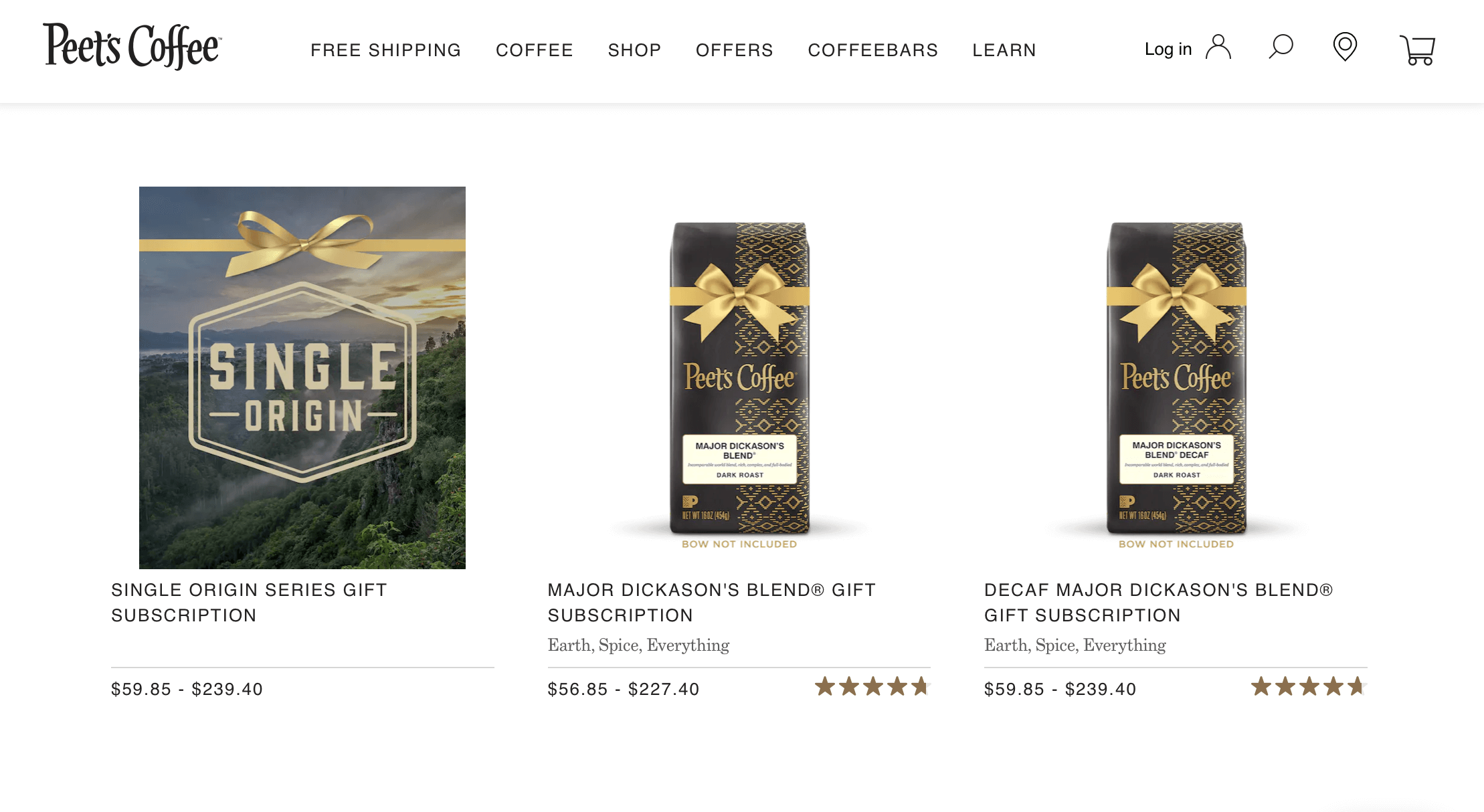Unfortunately, Peet’s Coffee is not offering franchise opportunities in 2023. But that doesn’t mean potential investors are locked out of business building opportunities with the coffee brand. Similar to Starbucks, Peet’s Coffee offers licensing agreements with privately owned and operated stores, giving entrepreneurs an entry point into this nearly 60-year-old coffee company.
While most of the company’s 338 locations are company owned and operated there’s room for more Peet’s Coffees through their licensing agreement. Let’s look at the history of Peet’s Coffee and the financial requirements and fees that go into opening a Peet’s Coffee, and what kind of returns you can expect after opening a licensed location. Take our 7-minute quiz and get matched with a franchise business that is an option right now.
Page Contents
- What Is Peet’s Coffee?
- Does Starbucks Own Peet’s Coffee?
- Why Do Consumers Prefer Peet’s Coffee Compared to Starbucks and Other Chains?
- Can You Join Peet’s FoodService Program?
- Peet’s Coffee Licensed Partnerships
- Financial Requirements and Fees to License a Peet’s Coffee
- Average Sales / Revenue per Year
- How Much Profit Do Peet’s Coffee Licencees Make Per Year?
- Advantages
- Challenges
- Is Peet’s Coffee Right for You?
What Is Peet’s Coffee?
Touted by the company’s thorough timeline page as “the man who taught the world to drink coffee,” Peet’s Coffee founder Alfred Peet began his roasting journey in the 1930s in Holland. Alfreds lifelong commitment to tea and coffee (and, apparently, a boring stint in New Zealand) inspired him to found Peet’s Coffee, Tea & Spices” in Berkeley in 1966.
Company Facts
| Year Founded: | 1966 |
| Total Units: | 338 |
| Industry: | Food and Beverage |
This coffee and tea supplier was a far cry from the cafe now run under the “Peet’s Coffee” name, but it did lead to incredible innovation in the world of coffee, as well as the training the founders of Starbucks coffee.
Today, Peet’s Coffee is owned by Starbucks and offers its coffee both on location in its 338 or more coffee shops and at countless suppliers across the United States. While Peet’s Coffee does not offer franchise opportunities, it does offer licensing terms similar to Starbucks, allowing investors to start providing America with “superior coffee” as the company founder might put it.
Does Starbucks Own Peet’s Coffee?

Is Peet’s really owned by Starbucks?
While the Peet’s Coffee timeline is happy to point out that its founder taught the Starbucks founders how to brew coffee. As of 2012, Starbucks has been the proud owner of Peet’s Coffee. This $1 billion purchase has paid off, as Peet’s Coffee can be found at retail locations across the country and in 338 shops.
Interestingly enough, the coffee giant did not subsume its competition. Since Peet’s Coffee hits an important competitive niche for customers and comes with a history of brewing that stretches back to the ‘30s, it’s no surprise that the company continues to license out the brand, further spreading the influence of this classic cafe.
Of course, Starbucks does not use Peet’s Coffee at their locations, and the reverse is true of Peet’s Coffee. The two brands seem to have found a way to coexistence in the 11 years since the acquisition. So while Starbucks may own Peet’s Coffee in an exciting twist of fate for the companies, it seems like Peet’s Coffee is here to stay.
Why Do Consumers Prefer Peet’s Coffee Compared to Starbucks and Other Chains?
Peet’s Coffee is far from outshining Starbucks, as the coffee giant has thousands of global locations and a brand reputation that’s hard to beat. However, Peet’s Coffee is still a favorite among locals and coffee afficianados. According to some sources, Peet’s Coffee contains less caffeine (and more flavor) than Starbucks coffee, making it the coffee of choice for the discerning drinker. For those overwhelmed by Starbucks’ success (or slightly too hipster for popular coffee chains), Peet’s Coffee has almost 60 years of experience to back up its brewing process.
Another benefit to Peet’s Coffee is that customers pay less for their coffee at Peet’s and are likely to buy it for their home from second-party retailers. So while the real Peet’s versus Starbucks debate primarily comes down to personal preference, the prevalence of this coffee brand shows that Peet’s Coffee holds its own in the ongoing debate.
Can You Join Peet’s FoodService Program?
With over 1,500 “pouring partners” and 10,000 or more office coffee accounts, Peet’s FoodService program is open to new applicants. With specialized training to help baristas properly serve Peet’s Coffee to office partnerships meant to bring fresh coffee to the workplace, this company offers license agreements to more than just coffee shops and cafes.
With genuinely innovative locations as part of its FoodService program, including university campus locations and airport lounges, the program may be a good direction for investors looking to use the Peet’s Coffee brand without starting a new cafe location. While the details of their partnerships are locked behind an inquiry form, as of 2023, they are accepting applications.
Peet’s Coffee Licensed Partnerships

Peet’s celebrated its 50th anniversary back in 2016.
While Peet’s Coffee does not offer franchise opportunities, they have licensed partnerships for a wide range of investors, from those looking to serve Peet’s Coffee at their own small business to those hoping to leverage the “Peet’s Coffee” brand recognation to generate sales.
With licensing opportunities like this, the sky is the theoretical limit for investments. This company works closely to develop coffee distributors in odd or unique locations like universities, grocery stores, and more. Let’s dive into the licensed partnership requirements, fees, and royalty expectations that come along with Peet’s Coffee.
Financial Requirements and Fees to License a Peet’s Coffee
As with many companies that lock their licensing information behind an information form, there are no solid numbers available for the investment cost of partnering with Peet’s Coffee. Part of this is due to the flexible nature of their licensing offers, as they pair with independent coffee shop owners, offices, and more to distribute their coffee. Since investors cannot know the exact royalty percentage expected from Peet’s Coffee, it’s hard to determine what kind of financial investment versus benefit can be expected.
You Might Like: Can You Finally Open a Starbucks Franchise?
In general, coffee shop investors can expect varying returns depending on licensing versus franchise agreements with other companies. An excellent example of the average royalty fee expected in a franchise agreement is Caribou Coffee, which has a 5 to 6% royalty fee. While it is unknown if this royalty fee applies to Peet’s Coffee licensees, comparing the upkeep of different coffee franchises can give a good idea of what to expect from a Peet’s Coffee license deal.
With Peet’s Coffee, the licensing allows independent coffee shops to sell Peet’s Coffee at their location and can include using the Peet’s Coffee name on the cafe. However, since there is no overarching brand theme or franchise agreement, the cost of starting an independent coffee shop to work with Peet’s Coffee varies.
Starting a coffee shop from the ground up is cheaper than a full industrial kitchen and restaurant in some respects. However, without knowing Peet’s Coffee’s licensing terms and entry requirements, it’s unwise to build a business in hopes of meeting unknown criteria. If you are interested in licensing Peet’s Coffee, reaching out to the company and thoroughly reviewing all licensing standards before investing is the best way to determine if it is a wise investment.
Average Sales / Revenue per Year
Since Peet’s Company does not offer franchise agreements, and most locations are either licensed or corporately owned, looking at their overall sales can reflect on the overall health of the company rather than the success of the average unit.
| Systemwide Annual Sales 2020: | $893.52 million in 2020 |
| Systemwide Annual Sales 2021: | $962.82 million in 2021 |
| Organic Change: | 12.6% |
These amounts have been adjusted from EUR to USD for the reader’s convenience. Between 2020 and 2021, Peet’s Coffee saw an improvement of 12.6% in its overall annual revenue, including funds from sales and other departments.
Seeing a net positive on a business report is a good sign as far as potential investments, and while Peet’s Coffee may be smaller than Starbucks from a chain perspective, it continues to boast growth each year. In addition, the company has good liquid assets and continues to open new locations, indicating stability and long-term momentum for its licensees.
How Much Profit Do Peet’s Coffee Licencees Make Per Year?

Learn about the history of Peet’s coffee.
Since Peet’s Coffee offers licensing agreements to a wide range of businesses and does not offer sales reports, it can be hard to estimate the average profit of each Peet’s Coffee licensee. Therefore, while drawing comparisons between different franchise and licensing coffee shops may provide insight into the average salary of a Peet’s Coffee licensee, it does not offer concrete numbers, meaning the average investor is better served to reach out directly to Peet’s Coffee for their most up-to-date licensing agreement. If I’m ever able to find some better data on this subject, I’ll certainly share it right here.
Advantages
Here are some of the advantages of working with Peet’s Coffee:
- Established Brand Name: Brand name is the main selling point of any licensing deal, and Peet’s Coffee has nearly 60 years’ worth of reputation to offer. Not only does Peet’s Coffee claim to have brought great coffee to the United States, but it also is responsible for teaching Starbucks’ founders how to brew coffee. On reputation alone, Peet’s Coffee is close to a household name, if not in name recognition than in flavor, meaning that serving this signature coffee at your restaurant can entice customers.
- Owned by Starbucks: Peet’s Coffee is owned by Starbucks and offers the corporate backing that small businesses may only sometimes find. While franchising is off the table for this coffee shop, Starbucks managing Peet’s Coffee indicates that this brand is likely to stay, giving investors a sense of security in their investment.
You Might Like: What’s the Exact Cost to Open a Tim Hortons?
- Popular Perception: Peet’s Coffee holds a hipster story, touting great coffee and superior brewing techniques at an affordable price. This reputation helps attract specific niche customers who may otherwise avoid popular mainstream coffee brands, giving investors an added niche to market toward.
- Flexible Licensing Locations: From office coffee to cafes, Peet’s Coffee allows for more flexibility with its licensing opportunities than the average franchisee could dream of, meaning that innovative investors may find themselves well-matched to this coffee company.
- Positive Revenue Report: While 2020 to 2021 is not an extensive fiscal stability analysis, Peet’s Coffee has trended toward the positive within the last fiscal year, meaning that the company is, at the very least, stable and still growing. This, in turn, means that investors are unlikely to see the company drop off immediately or, at the very least, should still be able to profit from a licensing agreement.
Challenges
Here are some of the challenges of licensing with Peet’s Coffee:
- Lack of Information: From keeping their licensing terms behind an information form to not reporting individual unit sales clearly, Peet’s Coffee doesn’t give investors much information to work with. When planning for financial investment, unknowns are far from ideal, meaning that any investor should consider all aspects of the licensing agreement before making a decision.
- No Franchise Instructions: Peet’s Coffee doesn’t offer franchise opportunities, meaning that the average investor may need more background in running a coffee shop than they would with other franchise options. While brewing training is offered on their FoodService partnership page, whether or not this includes company management training is left unknown, which can further complicate things for potential entrepreneurs who are less than experienced in the food service industry.
- Could Be too Flexible: One thing that makes franchises reliable is their set-in-stone method of operation. A franchise owner creates a template that a franchisee can follow to avoid past mistakes and work toward success. While Peet’s Coffee offers unique licensing agreements, the lack of concrete guidelines and across-the-board location practices may pose challenges to investors.
Is Peet’s Coffee Right for You?
Peet’s Coffee offers unique licensing agreements for a wide range of storefronts and service models, but are they a good investment? Without more information on their licensing agreement, it is difficult to pass a verdict on Peet’s Coffee either way.
The brand’s history speaks volumes and may indicate a positive business partner, but without knowing more details, it’s impossible to make a financially grounded decision. If you’re looking for an alternative coffee chain with franchising opportunities, check out Tim Hortons. If you’ve got a net worth of $1.5 million and $500,000 in liquid assets, you could qualify to open this longstanding coffee franchise.





